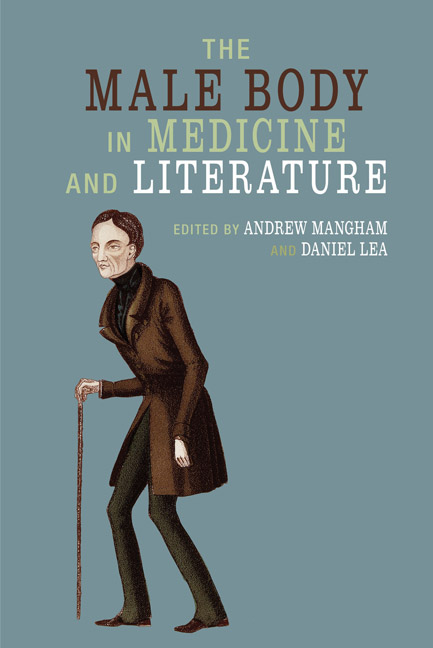Book contents
- Frontmatter
- Contents
- Acknowledgements
- Notes on Contributors
- Introduction
- Part One Enquiry and Experimentation
- 1 The Poetics of Anatomy: John Donne's Dissection of the Male Body
- 2 The Black Male Body in Early African American Science Fiction: The Experimental Case of Sutton Griggs's Imperium in Imperio
- 3 Miserrimus Dexter: Monstrous Forms of the Fin de Siècle
- 4 ‘Intellectual suicides’: The Man of Letters in Middlemarch
- Part Two Wounded and Psychopathologised Bodies
- Part Three Fear, Confusion and Contagion
- Index
1 - The Poetics of Anatomy: John Donne's Dissection of the Male Body
from Part One - Enquiry and Experimentation
- Frontmatter
- Contents
- Acknowledgements
- Notes on Contributors
- Introduction
- Part One Enquiry and Experimentation
- 1 The Poetics of Anatomy: John Donne's Dissection of the Male Body
- 2 The Black Male Body in Early African American Science Fiction: The Experimental Case of Sutton Griggs's Imperium in Imperio
- 3 Miserrimus Dexter: Monstrous Forms of the Fin de Siècle
- 4 ‘Intellectual suicides’: The Man of Letters in Middlemarch
- Part Two Wounded and Psychopathologised Bodies
- Part Three Fear, Confusion and Contagion
- Index
Summary
No matter how great our minds, or how ambitious our plans, human endeavours are still defined by the capabilities, and limitations, of the physical body. Even in today's age of artificial intelligence, the technology itself cannot be developed or manufactured without the necessary input from a living, breathing physical visionary. The human body, at least for the moment, establishes how far we can reach into the unknown, even how far we can go to improve our own physical existence. There is nothing modern about this paradox. In the early modern period, the desire for discovery ranged from the explicitly physical (the exploration of new worlds) to the more cerebral, philosophical conversations that were equally reliant on the fleshy vessel which contained the thoughts, despite the hypotheses of Cartesian dualism.
Renaissance Man was a discoverer who boldly entered literal, philosophical, scientific and theological territories to collect any knowledge that would benefit current and future generations. Given these ambitions, one area of exploration was of particular interest to such men – their own, male bodies. If they could perhaps reveal just how they were functioning while on earth, they may be able to expand their horizons even further. Their task, however, was a daunting one. An exploration of the male body was not an expedition to a country far away from home, but a journey inside their own physicality – a world that they thought they knew so well. There was understandable trepidation which sat somewhat uneasily alongside the excitement that accompanied any Renaissance discovery. In the work of the enigmatic poet John Donne we join such pioneering men as they discover the secrets of the male body and correct details that had, up to this point, seemed certainties. Donne emphasises that to know the male body is to increase man's power and authority over the earthly world; however, his verses also highlight the tensions when the familiar is made unfamiliar and the property that men thought they knew and owned is revised on the anatomy table before them.
The Philosophy and History of Dissection
In the late sixteenth century the art of dissection had been made public and, as a result, popular interest in anatomy was growing.
- Type
- Chapter
- Information
- The Male Body in Medicine and Literature , pp. 17 - 33Publisher: Liverpool University PressPrint publication year: 2018



